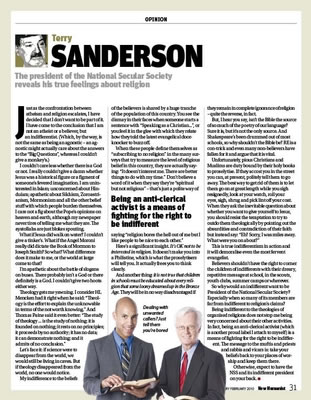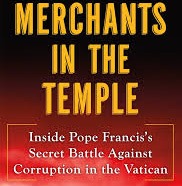 Just as the confrontation between atheism and religion escalates, I have decided that I don’t want to be part of it. I have come to the conclusion that I am not an atheist or a believer, but an indifferentist. (Which, by the way, is not the same as being an agnostic – an agnostic might actually care about the answers to the “Big Questions”, whereas I couldn’t give a monkey’s.)
Just as the confrontation between atheism and religion escalates, I have decided that I don’t want to be part of it. I have come to the conclusion that I am not an atheist or a believer, but an indifferentist. (Which, by the way, is not the same as being an agnostic – an agnostic might actually care about the answers to the “Big Questions”, whereas I couldn’t give a monkey’s.)
I couldn’t care less whether there is a God or not. I really couldn’t give a damn whether Jesus was a historical figure or a figment of someone’s fevered imagination. I am uninterested in Islam; unconcerned about Hinduism; apathetic about Sikhism, Zoroastrianism, Mormonism and all the other belief stuff with which people burden themselves. I care not a fig about the Pope’s opinions on heaven and earth, although my newspaper never tires of telling me what they are. The ayatollahs are just blokes spouting.
What if Jesus did walk on water? I couldn’t give a tinker’s. What if the Angel Moroni really did dictate the Book of Mormon to Joseph Smith? So what? What difference does it make to me, or the world at large come to that?
I’m apathetic about the battle of slogans on buses. There probably isn’t a God or there definitely is a God. I couldn’t give two hoots either way.
Theology gets me yawning. I consider HL Mencken had it right when he said: “Theology is the effort to explain the unknowable in terms of the not worth knowing.” And Thomas Paine said it even better: “The study of theology ... is the study of nothing; it is founded on nothing; it rests on no principles; it proceeds by no authority; it has no data; it can demonstrate nothing; and it admits of no conclusion.”
Let’s face it: if science were to disappear from the world, we would still be living in caves. But if theology disappeared from the world, no one would notice.
My indifference to the beliefs of the believers is shared by a huge tranche of the population of this country. You see the dismay in their faces when someone starts a sentence with “Speaking as a Christian...”, or you feel it in the glee with which they relate how they told the latest evangelical door-knocker to buzz off.
When these people define themselves as “subscribing to no religion” in the many surveys that try to measure the level of religious belief in this country, they are actually saying: “It doesn’t interest me. There are better things to do with my time.” Don’t believe a word of it when they say they’re “spiritual but not religious” – that’s just a polite way of saying “religion bores the hell out of me but I like people to be nice to each other.”
Here’s a significant insight. It’s okay not to be interested in religion. It doesn’t make you into a Philistine, which is what the proselytisers will tell you. It actually frees you to think clearly.
And another thing: it is not true that children in schools must be educated about every religion that some loony dreamed up in the Bronze Age. They will be in no way disadvantaged if they remain in complete ignorance of religion – quite the reverse, in fact.
But, I hear you say, isn’t the Bible the source of so much of the poetry of our language? Sure it is, but it’s not the only source. And Shakespeare’s been drummed out of most schools, so why shouldn’t the Bible be? RE is a con-trick and even many non-believers have fallen for it and argue that it is vital.
Unfortunately, pious Christians and Muslims are duty bound by their holy books to proselytise. If they accost you in the street you can, at present, politely tell them to go away. The best way to get rid of them is to let them go on at great length while you sigh resignedly, look at your watch, roll your eyes, sigh, shrug and pick lint off your coat. When they ask the inevitable question about whether you want to give yourself to Jesus, you should resist the temptation to try to outdo them theologically by pointing out the absurdities and contradiction of their faith but instead say: “Eh? Sorry, I was miles away. What were you on about?”
This is true indifferentism in action and it will demoralise even the most fervent evangelist.
Believers shouldn’t have the right to corner the children of indifferents with their dreary, repetitive message at school, in the scouts, youth clubs, summer camps or wherever.
So why would an indifferent want to be President of the National Secular Society? Especially when so many of its members are far from indifferent to religion’s claims?
Being indifferent to the theologies of organised religions does not stop me being very concerned about their other activities. In fact, being an anti-clerical activist (which is another proud label I attach to myself) is a means of fighting for the right to be indifferent. The message to the muftis and priests and rabbis and vicars is: take your beliefs back to your places of worship and keep them there.
Otherwise, expect to have the NSS and its indifferent president on your back.

